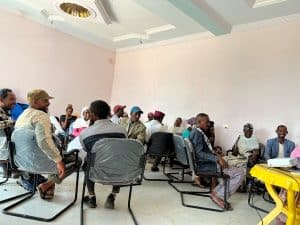I participated in a gender training program as a volunteer facilitator in Arerti, Ethiopia, to foster understanding of an approach called Gender Model Family (GMF), which promotes inclusivity to create a more equitable society and creates a safe and empowering space for participants to explore and discuss gender-related issues.
As a volunteer from Canada, I am excited to provide gender training and learn from the participants.
Preparation and planning
Prior to the workshop, I designed a comprehensive agenda that covered various topics related to gender, including gender expression and the impact of gender roles on society. I then introduced the GMF approach.
Creating a safe space
Recognizing the sensitive nature of these topics, I emphasized the importance of creating a safe and inclusive environment. We established ground rules at the beginning of the workshop to ensure everyone felt respected and heard. I encouraged open dialogue while being mindful of potential triggers and emotional responses. This approach fostered a sense of trust among participants, enabling them to share their thoughts and feelings openly.
The initiative empowered men and women, by raising awareness about the GMF approach and promoting inclusivity within their community. As a volunteer, I was excited to be part of an effort to create positive change and a more equitable society.

A Gender Model Family training session.
Understanding context
Before starting the gender training sessions, it was a priority to understand the community’s unique cultural context. We worked with CDF Canada staff in Ethiopia to tailor the training materials to their specific needs and values.
Overcoming language barriers
Since most participants spoke only Amharic, we found innovative ways to communicate effectively. Visual slides and storytelling were essential components of our training sessions. The use of colours, symbols, and simple graphics helped convey important messages on gender equality.
Exploring gender concepts
We introduced the concept of gender, emphasizing that it goes beyond biological differences. We discussed how gender roles are assigned in various societies and explored the potential consequences of reinforcing stereotypes.
Promoting inclusivity
Our focus promoted inclusivity and ensured both men and women had equal opportunities in decision-making using the GMF approach. We discussed the importance of sharing responsibilities within households and communities as well as the significance of women’s involvement in economic activities.
Through open discussions and group activities, we encouraged participants to question certain practices and explore alternative ways to protect women’s rights and well-being.
Arerti is a traditional community where gender roles are strictly defined. Participants shared their concerns regarding equitable gender roles and how their society would view them. The men felt society would see them as less masculine if they engaged in housekeeping duties. Thus, involving men in gender training was crucial for breaking down barriers and challenging entrenched societal norms. We set out to build empathy among men by helping them understand the challenges faced by women and the benefits of gender equality for the entire community.
Action plans and follow-up
Towards the end of the workshop, participants were encouraged to develop action plans to implement positive changes in their families. We discussed ways to challenge gender discrimination and promote equality within their spheres of influence. To ensure the workshop’s impact extended beyond the event, we are providing ongoing support, resources, and opportunities for participants to stay engaged in gender advocacy.
Conclusion
The Gender Workshop was a resounding success, empowering participants to be more informed advocates for gender equality and inclusion. By fostering open dialogue, challenging stereotypes, and promoting empathy, it laid the foundation for a more equitable and just society. As a volunteer facilitator, I was deeply moved by the transformative experience of participants and remain committed to continuing this vital work in the future.
Gender Model Family
As part of CDF Canada’s approaches towards gender transformation, the Gender Model Family (GMF) approach is incorporated to address gender inequalities at both the household and community levels by promoting equitable division of unpaid work. It begins with training on basic gender concepts to build an understanding of the unequal distribution of care work between men and women. After the initial training sessions on gender awareness, participants assess the division of domestic chores in their own household and compare the daily activity profiles of women and men. They then work together to devise a household action plan that assigns chores in a more equitable way. As both men and women contribute to household work, they have time to engage in other income-generating activities and have more free time to enjoy as a family. This involves a series of trainings and follow-up sessions.
To date, the approach has brought on positive outcomes for project participants, in terms of more gender-equitable family dynamics and overall community cohesiveness. Along with CDF Canada’s co-operative development approaches that create an enabling environment for Women’s Economic Empowerment, the GMF approach is fostering social transformations that allow women to develop their professional skills and excel as entrepreneurs, all with the help and support of their husbands and male family members.